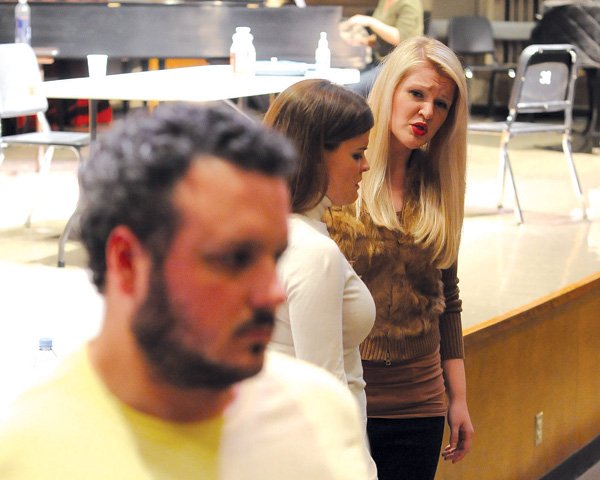Tamara Ryan spent hours reading scripts that held the potential to be Opera Fayetteville’s second production.
Ryan, who manages the fledgling company’s resources, had some ideas of keeping the show small. Then she read “Dead Man Walking,” a newer opera written by Jake Heggie with a libretto by Terrence McNally.
It left her crying.
“If it was coming from my practical side, it may not have been the best show,” says Ryan, a Fayetteville-raised opera singer now living in Boston.
The upcoming production, to be staged in Fayetteville on Jan. 11 and again Jan. 13, requires an orchestra of 32 players, 11 principal singers and several additional choruses.
“It’s going to be sonically and emotionally overwhelming,” Ryan says.
The story is a familiar one, first told courtesy of the novel “Dead Man Walking.” It was written by Sister Helen Prejean, a nun who offered counseling to Joseph De Rocher, a convicted murder awaiting execution for the crime. A movie version starring Susan Sarandon and Sean Penn debuted in 1995.
It was also told to Northwest Arkansas residents in a more personal way - Prejean herself chatted as part of a nonviolence panel with civil rights activist Vincent Harding and the Dalai Lama during a visit to the University of Arkansas in May 2011.
As an opera, the story continues packing an emotional wallop, says Lindsey Anderson, the vocalist charged withportraying Prejean in Opera Fayetteville’s production.
She remembers watching the movie and feeling its power before she ever knew it as an opera.
“I’m amazed. … He (author Jake Heggie) really captures the music of the English language. It’s very natural. It’s a beautiful change. I think it’s one of the most important current American operas,” Anderson says.
After she appeared in Opera Fayetteville’s premiere offering, “Little Women,” in January 2012, Ryan officially awarded Anderson the roleof Prejean in August. In the months since, Anderson and castmates, particularly Daniel Scofield as De Rocher, have been studying and preparing for the roles.
The cast gathered for joint rehearsals for the first time at the beginning of the year.
Those with roles come from all over the country, and several of them are friends Ryan has made during her career as a vocal talent. The show will be directed by Kyle Lang, who has worked with Opera Memphis, Lyric Opera Baltimore and more.
Correction
The original version of this story misstated the name of the director. The error has been corrected.
Robert Mueller, conductorof the University Symphony Orchestra at the University of Arkansas, will lend his baton to the production’s orchestra.
Ryan has high hopes for the response to “Dead Man Walking,” her organization’s second offering. Having a opera company in the town where her parents still live was a dream until she made it happen last year. The plan is to continue offering one production per season, most likely at this time of year.
“There aren’t a lot of winter operas,” Ryan says.
“We have good access to a lotof quality talent.”
And the productions are likely to follow the path of “Dead Man Walking” in that they will be modern and fresh. That’s one of the things that inspired Anderson.
“My first experience with Opera Fayetteville was great,” Anderson says. “I really like her mission. Not just opera, but American opera. People like to see the classics. But I think Tamara wants to bring something fresh and relevant to the audience.”
The group’s current show is relevant in that it discusses a controversial topic, but Ryan insists “Dead Man Walking” is powerful because it makes the audience think without pushing a side.
“Most importantly, it doesn’t have a specific message. I think that’s what’s really beautiful about this piece. I don’t think this is an opera for the death penalty. I don’t think this an opera against the death penalty,” she says.
But a powerful opera, for sure, Anderson agrees.
“It’s modern, but it’s still very effective. And it’s the kind of music the story calls for. The marriage of the text and the music is stunning and very moving,” she says.
Whats Up, Pages 12 on 01/04/2013

